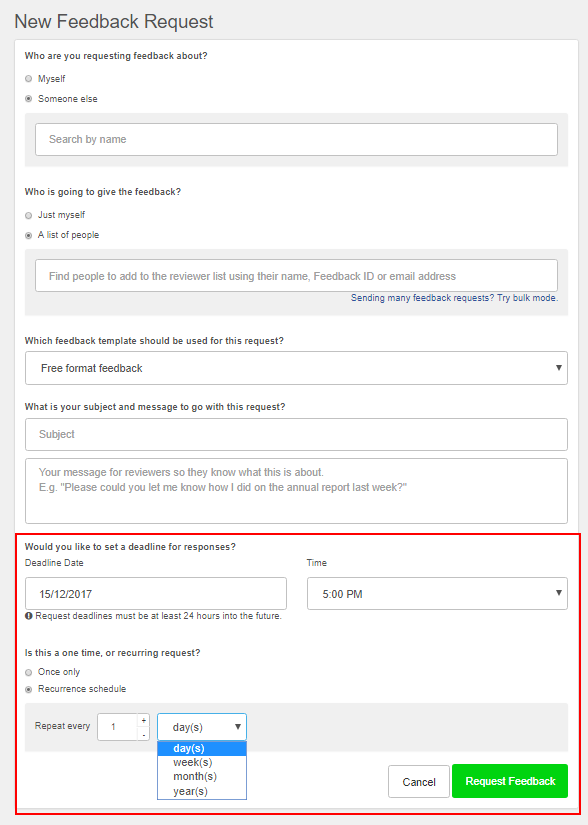
One of the hardest habits for people to forge with the introduction of real time feedback or continuous coaching is the habit of regularly observing and commenting on the performance of other people, especially in a non-critical way.
Like eating healthy, drinking more water or exercising more, sharing more feedback takes discipline to start and to keep it up.
It's a habit that needs frequent and strong nudges to help it along, and we've found that one single approach to this will not work for everyone.
After our own observations of how the 7 modes of feedback in Pay Compliment are used we've made some changes to simplify this habit for both managers and non-managers.
Building in performance management nudges
Reminders
Being asked to give feedback is a sign of trust. Being tardy in response to that request can break the confidence of the requestor and cause them anxiety. Feedback requests are good only if they are responded to.
We found that people are fairly poor at responding to requests even though they are being invited to comment.
To address this, recently we introduced weekly reminders to advise users if there were feedback requests they had not yet responded to.
This was more effective than no reminders, but it was still not a strong enough nudge to get the responsiveness to feedback requests that we're looking for.
Scheduled Feedback
At the same time, few managers were using the scheduler to prompt them to give feedback to their team members on a regular basis.
The scheduler was somewhat buried away in our system in a place that only managers had access to, which was a barrier and we felt we could do better with this.
We've learned a lot about equity since we initially designed Pay Compliment, and we realized it was inequitable to only allow managers to schedule feedback. Why shouldn't anyone be able to do this? Well now they can!
Deadlines and recurrence
The changes we have launched today take feedback nudges to the next level.

Firstly we've added a deadline to the request so that we can remind reviewers on the basis of this deadline.
Next we've added recurrence (similar to recurring meetings) so that one request can be repeated at the frequency of your choosing.
We've also made scheduling available to anyone, so a manager may choose to push feedback to their team members with a regular rhythm, or a team member may choose to pull feedback from their manager (or anyone else) at the frequency they feel they need to achieve and grow.
By individualising the schedules it's now easier than ever to vary feedback frequency based on the person and not on the team they belong to. This felxibility caters for situations where a new starter might get feedback more frequently than an experienced staffer in the same team for example.
Request half-life
With scheduled feedback we have also heard from our customers that even if they schedule feedback once a month (the most common frequency) it's easy to forget what happened at the start of the month and they tend to focus their observations on what happened at the end. This is recency bias and it's long been known as a problem in annual performance reviews but it's interesting to note that it also applies to modern performance management.
To combat recency bias we've implemented the idea of request half life where we nudge a reviewer to draft their feedback to-date, even though the final deadline is off into the future. it works by dividing the remaining window for review in half and prompting for observations to be captured in draft at that point in time.
If a review is set at 1 month intervals the system will prompt several times over the month;
First half way through the month
Next half way through the final 2 weeks
Next half way through the final week,
and every day for the final 4 days up to the deadline.
If that sounds like a lot of nudging, that's what we've found it takes to get this habit in place.
Flexibility
Flexibility in the Pay Compliment platform is the key to agility.
There are many ways that today's features can be configured to drive the outcomes that an organisation, a team, a manager or an individual are striving for.
We have seen gradual growth in the popularity of feedback requests in the 2.5 years since we made them available in our platform, and we are looking forward to seeing even more feedback request activity as a result of these enhancements.
The formation of habits for real time performance management is difficult, and we are happy to provide a toolset that not only makes this easier but also makes it measurable.
We worry about organisations that say they have continuous coaching in play without a continuous feedback platform. We know from our data that human behaviour does not naturally adapt and that significant nudges are needed to form and reinforce real time performance conversations.
We delight in the idea that our customers can demonstrate the frequency and quality of these conversations, where they are absent, where they are strong, and additionally derive great insights from the narrative of feedback that we capture.
If you'd like to explore how you could reinforce frequent feedback habits within your organisation, please give us a call or drop us a line.